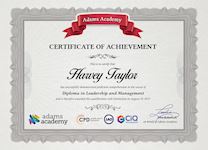'Coaching and Mentoring Advanced Diploma Level 4' + 'Office Administration Online Training Course'' - Two Accredited Courses in 1
Adams Academy
Summary
- Tutor is available to students
Overview
Course Highlights
- Internationally recognised accredited qualification
- 1 year accessibility to the courses
- Free e-Certificates
- Instant certificate validation facility
- Properly curated course with comprehensive syllabus
- Full-time tutor support on working days (Monday – Friday)
- Efficient exam system, assessment and instant results
- Access to the course content on mobile, tablet or desktop from anywhere anytime
- Eligible for **NUS Extra** card which gives you 1000’s of discounts from biggest companies.
Coaching and Mentoring Advanced Diploma Level 4
A coach or mentor support a learner to achieve certain specific personal or professional goals. A coach helps others to meet their life goals. Though there is some little difference between mentoring and coaching, the goals of these two are the same: to achieve a particular desire. The course provides the basics of life coaching and mentoring. Whether a person wants to gain personal goal or professional goal, the course is perfect for everyone as it depicts the basics for all types of goals. In this course, you will learn how to set up the goal, what are the procedures for gaining the goal, how to work for the goal, how to adjust with long-term activities for achieving the goal, etc.
Office Administration Online Training Course
Office administration is an arrangement of daily exercises that are identified with monetary arranging, record keeping and charging, staff, natural circulation and coordination’s, inside an association. Office Administration has progressed into a multitasking work that fuses a grouping of manual and electronic endeavours, spreadsheet and essential money related management, and furthermore customer advantage and relational relations. This course will upgrade your aptitudes in the present most frequently used office PC applications and in the wander organisation abilities required by the current supervisors. In this course, you will take in the fundamental skills, learning and data of office organisation. It will help you enhance your skills, aptitudes, knowledge and abilities to master office administration. This course could be beneficial not only in your professional lives but also in your social lives and also at home teaching you right from scratch. So go ahead and enrol now!
CPD
Course media
Description
COURSE CURRICULUM
Course 01: Coaching and Mentoring Advanced Diploma Level 4
Life Coaching Basics
Introduction to Life Coaching
Life Calling Theory and Model
Additional Coaching Theories and Perspectives
Overview of the Life Coaching Process
Coaching Delivery Systems
Coaching Competencies & Activities
Coaching Documentation
Life Coaching
Definition of a Happy and Successful life
Self Improvement through motivation
Goal setting
The distinction between Goals and Values
20 qualities for a successful life
Stress Management
Time Management
Challenging yourself to be motivated
Ways to Maximize your Potential
Overcome Obstacles Created by Your Self-Limiting Beliefs
Aspects of human behavior to succeed
Why motivation is important for a successful life
Role of Education in successful life
Social roles for a successful life
Maintaining work life balance
What make a person Unsuccessful?
Dealing with Life Challenges
Criteria for idealising successful people in the world
Factors behind importance of motivation in successful life
Mentoring Basics
Introduction – The Mentor-Protege Relationship
Benefits of a Protégé
Mentor Benefits of Having a Protege
Where to Look Mentor-Protégé Programs
Picking a Protégé
Communication
Working with a Protégé
The Exit Strategy
Running Multiples
Lather, Rinse, Repeat
Appendix: How to Be a Professional Altruist
Coaching and Mentoring
Module One – Getting Started
Module Two – Defining Coaching and Mentoring
Module Three – Setting Goals
Module Four – Understanding the Realities
Module Five – Developing Options
Module Six – Wrapping it All Up
Module Seven – The Importance of Trust
Module Eight – Providing Feedback
Module Nine – Overcoming Roadblocks
Module Ten – Reaching the End
Module Eleven – How Mentoring Differs from Coaching
Module Twelve – Wrapping it Up
Coaching & Mentoring Diploma Level 3- Activities
Course 02: Office Administration Online Training Course
Admin Support
Module One – Getting Started
Module Two – Getting Organized (I)
Module Three – Getting Organized (II)
Module Four – Managing Time
Module Five – Getting It All Done On Time
Module Six – Special Tasks
Module Seven – Verbal Communication Skills
Module Eight – Non-Verbal Communication Skills
Module Nine – Empowering Yourself
Module Ten – The Team of Two
Module Eleven – Taking Care of Yourself
Module Twelve – Wrapping Up
Business Writing
Module One – Getting Started
Module Two – Working with Words
Module Three – Constructing Sentences
Module Four – Creating Paragraphs
Module Five – Writing Meeting Agendas
Module Six – Writing E-mails
Module Seven – Writing Business Letters
Module Eight – Writing Proposals
Module Nine – Writing Reports
Module Ten – Other Types of Documents
Module Eleven – Proofreading and Finishing
Module Twelve – Wrapping Up
Bookkeeping & Payroll Management
Module One – Introduction
Module Two – Basic Terminology
Module Three – Basic Terminology (II)
Module Four – Accounting Methods
Module Five – Keeping Track of Your Business
Module Six – Understanding the Balance Sheet
Module Seven – Other Financial Statements
Module Eight – Payroll Accounting Terminology
Module Nine – End of Period Procedures
Module Ten – Financial Planning, Budgeting and Control
Module – Eleven Auditing
Module Twelve – Wrapping Up
Customer Service and Telephone Handling
Module One – Getting Started
Module Two – Aspects of Phone Etiquette
Module Three – Using Proper Phone Language
Module Four – Eliminate Phone Distractions
Module Five – Inbound Calls
Module Six – Outbound Calls
Module Seven – Handling Rude or Angry Callers
Module Eight – Handling Interoffice Calls
Module Nine – Handling Voicemail Messages
Module Ten – Methods of Training Employees
Module Eleven – Correcting Poor Telephone Etiquette
Module Twelve – Wrapping Up
Microsoft Word
Module One – Getting Started
Module Two – Opening
Module Three – Working with the Interface
Module Four – Your First Document
Module Five – Basic Editing Tasks
Module Six – Basic Formatting Tasks
Module Seven – Formatting Paragraphs
Module Eight – Advanced Formatting Tasks
Module Nine – Working with Styles
Module Ten – Formatting the Page
Module Eleven – Sharing Your Document
Module Twelve – Wrapping Up
Activities- Microsoft Word for Beginners
Microsoft Excel
Module One – Getting Started
Module Two – Opening Exce
Module Three – Working with the Interface
Module Four – Your First Worksheet
Module Five – Viewing Excel Data
Module Six – Building Formulas
Module Seven – Using Excel Functions
Module Eight – Using Quick Analysis
Module Nine – Formatting Your Data
Module Ten – Using Styles, Themes, and Effects
Module Eleven – Printing and Sharing Your Workbook
Module Twelve – Wrapping Up
Activities – Microsoft Excel Beginners Level 2
Microsoft PowerPoint
Module One – Getting Started
Module Two – Opening PowerPoint
Module Three – Working with the Interface
Module Four – Your First Presentation
Module Five – Working with Text
Module Six – Formatting Text and Paragraphs
Module Seven – Adding Pictures
Module Eight – Advanced Formatting Tasks
Module Nine – Working with Transitions and Animations
Module Ten – Setting Up Your Slide Show
Module Eleven – Showtime!
Module Twelve – Wrapping Up
Activities-Microsoft PowerPoint for Beginners
Microsoft Access
Module One – Getting Started
Module Two – Opening and Closing Access
Module Three – An Introduction to Databases
Module Four – Sharing Data Using Apps
Module Five – Working in Your App
Module Six – An Introduction to Desktop Databases
Module Seven – Performing Basic Table Tasks
Module Eight – Working with Fields
Module Nine – Working with Table Relationships
Module Ten – An Introduction to Queries, Forms, and Reports
Module Eleven – Protecting Your Data
Module Twelve – Wrapping Up
Activities – Microsoft Access for Beginners
Microsoft Outlook
Module One – Getting Started
Module Two – Opening and Closing Outlook
Module Three – Understanding the Interface
Module Four – Working with the Message List and the Reading Pane
Module Five – Using Message List Commands
Module Six – Creating a New Email
Module Seven – Managing Email
Module Eight – Searching for Items
Module Nine – An Introduction to the Calendar
Module Ten – An Introduction to Tasks
Module Eleven – An Introduction to Contact
Module Twelve – Wrapping Up
Activities – Microsoft Outlook for Beginners
Assessment & Certification
Once you complete all the lessons/units, you are required to sit an exam which is multiple-choice. The pass mark is 60%. After successfully passing the exam you can obtain your certificate of achievement at an additional cost of £8 each.
Who is this course for?
There is no experience or previous qualifications required for enrolment in this course. It is available to all students of all academic backgrounds.
Career path
This course opens a new door for you to enter the relevant job market and also gives you the opportunity to acquire extensive knowledge along with required skills to become successful in no time. You will be able to stand out in the crowd after completing this course. You will also be able to add our qualifications to your Resume and make yourself worthy in the competitive job industry.
Questions and answers
Currently there are no Q&As for this course. Be the first to ask a question.
Reviews
Currently there are no reviews for this course. Be the first to leave a review.
Legal information
This course is advertised on reed.co.uk by the Course Provider, whose terms and conditions apply. Purchases are made directly from the Course Provider, and as such, content and materials are supplied by the Course Provider directly. Reed is acting as agent and not reseller in relation to this course. Reed's only responsibility is to facilitate your payment for the course. It is your responsibility to review and agree to the Course Provider's terms and conditions and satisfy yourself as to the suitability of the course you intend to purchase. Reed will not have any responsibility for the content of the course and/or associated materials.



